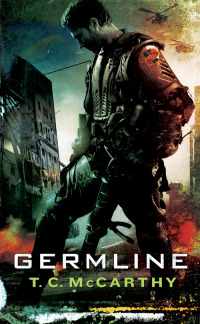Germline by T.C. McCarthy
 Wednesday, July 20, 2011 at 9:53AM
Wednesday, July 20, 2011 at 9:53AM 
Published by Orbit on July 26, 2011
This is the second military science fiction novel I’ve read in recent months that is told from a journalist’s point of view (the other is Dan Abnett’s Embedded). Germline is by far the better of the two: the characters have more depth, the battle scenes are more realistic (the emphasis is on survival rather than gunning down hoards of enemy troops), the plot is more complex, and the focus is on the internal damage that war inflicts on soldiers rather than the external bloodshed (although fans of gore and decapitation will be well satisfied).
Marines are fighting Russians in Kazakhstan, in tunnels and on the ground, to gain control of ores and minerals that both sides would like to mine. Reporter Oscar Wendell is embedded with the Marines, getting high and hoping to stay alive long enough to win a Pulitzer. Given a choice, Wendell and the Marines prefer to be in the tunnels (the subterrene) where, surrounded by rock walls, they’re less likely to be shot or burned to a cinder -- unless the enemy tunnels into a chamber occupied by soldiers and fills it with plasma.
Fighting alongside (or ahead of) the Marines are genetically engineered teenage girls who move “like lighting on speed.” According to Wendell, the Genetics look like killers but smell like they should be “sitting in school, driving guys crazy with a miniskirt.” I have to wonder whether T.C. McCarthy threw them into the mix on the assumption that the majority of sf fans are young (or not so young) men who will enjoy reading about genetically engineered teenage girls who look like “a track team gone bad.” Why not fight the war with genetically engineered teenage boys? Because boys don’t smell like they would look good in miniskirts? We eventually learn that genetically engineered males do exist but, like so many things, they aren’t American made. We also learn that American defense contractors don’t make genetically engineered boys for reasons that (when they are finally revealed) didn’t strike me as convincing.
Silly as all this sounds, McCarthy at least builds some interest into the factory-made girls; they’re programmed to fight and die but they retain most human instincts (including, of course, the desire to kiss Wendell). Although the Genetics are trained to believe in “death and faith” and are designed to rot away after they turn eighteen (a less appealing fate than the glorious death in combat they are conditioned to crave), Wendell finds that he prefers them to human women, apparently because they are less complicated (a characteristic Wendell identifies as “innocence”). Perhaps too predictably, Wendall develops feelings for a couple of Genetics (unlike the Marines, who seem to be creeped out by them). There are echoes of Blade Runner here, with its replicants who want to continue living past their expiration dates, but fortunately Germline follows a somewhat different path.
There’s more to this novel than fighting, but war pervades the story. The combat imagery is vivid and intense, making Germline rich in atmosphere. Germline is nevertheless at its best when the spotlight moves from war to Wendell.
Wendell’s self-destructive tendencies make him an intriguing character. He’s often fighting his own demons: his fear, his occasional death wish, his desire to tune out the war in a haze of drugs, his need for attachment to a female even if she isn’t a real person. Wendell experiences personal growth (or at least change, for better or worse) during the course of the novel. He has a better understanding of his nature and -- as he comes to understand a Genetic -- begins to question what it is to be human when thoughts and personality are shaped by war’s dehumanizing experiences. The last chapter contains some surprisingly strong writing about the aftermath of war as Wendell, like every combat veteran, realizes that he can never be the person he was before the war, that he must adapt to a new way of living. This aspect of the novel is very well done.
Germline is the first book in a series called The Subterrene War. I hope the others are as strong as this one.
RECOMMENDED
 Rec,
Rec,  T.C. McCarthy in
T.C. McCarthy in  Science Fiction
Science Fiction
Reader Comments (1)
You freakin' ROCK! Thanks for this; I am always grateful when someone does a thoughtful analysis in addition to giving a thumbs up or down.